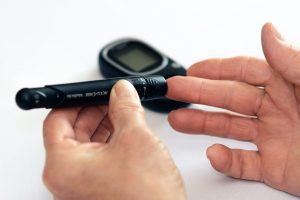 Obstructive sleep apnea is a common disorder that causes at least 5 interruptions in breathing per hour that last for at least 10 seconds or longer. The American Sleep Apnea Association reports about 22 million adults have sleep apnea. Several factors can contribute to the onset of the disorder, like a large neck circumference and obesity; however, researchers have recently discovered another connection. A study published in Family Medicine reports a link between type 2 diabetes and sleep apnea. Here are the facts you need to safeguard your health and wellness.
Obstructive sleep apnea is a common disorder that causes at least 5 interruptions in breathing per hour that last for at least 10 seconds or longer. The American Sleep Apnea Association reports about 22 million adults have sleep apnea. Several factors can contribute to the onset of the disorder, like a large neck circumference and obesity; however, researchers have recently discovered another connection. A study published in Family Medicine reports a link between type 2 diabetes and sleep apnea. Here are the facts you need to safeguard your health and wellness.
Sleep Apnea and Type 2 Diabetes
Sleep apnea is most often caused by the soft tissues in the back of the mouth and throat collapsing, which creates a blockage in the airway. Although anyone can develop the disorder, the study featured in Family Medicine found people with type 2 diabetes have a 50-50 chance of being diagnosed with sleep apnea.
Unfortunately, that isn’t the only problem. Sleep apnea is known to worsen the symptoms of diabetes, which can lead to several health concerns, like high blood pressure, heart disease, and stroke. Untreated sleep apnea can influence an increase in glucose and overall poor quality of life. Not to mention, it can also lead to a variety of health issues, like cardiovascular disease.
Symptoms of Sleep Apnea
Although 1 in every 15 Americans has sleep apnea, as much as 2 to 4% of people aren’t diagnosed. With the two conditions coexisting because of multiple shared risk factors, it’s crucial to get treatment for sleep apnea, especially if you have type 2 diabetes. It’s best to contact your physician immediately if you have any signs of the sleep disorder, including:
- Waking choking or gasping for air
- Morning headaches
- Fatigue
- Chronic snoring
- Waking with a sore or dry throat
- Loss of concentration
- Mood changes or irritability
Treating Sleep Apnea
Your physician may recommend a sleep study to gather the necessary information for a proper diagnosis. You’ll then be referred to your dentist for sleep apnea therapy, which can include:
- CPAP Machine: A steady stream of air pressure is delivered through a mask worn over the nose to keep the airways open.
- Oral Appliance: Mild-to-moderate cases can be treated with an oral appliance, which repositions the lower jaw forward to prevent pauses in breathing. It can be used alone or with a CPAP.
- Healthy Lifestyle: Obesity increases the risk of both sleep apnea and type 2 diabetes. Maintaining a healthy lifestyle is crucial to managing your diabetes and sleep apnea.
Don’t lose sleep at night worrying about your health. Your dentist has the solutions you need to safely treat your sleep apnea.
About Dr. West
Dr. West’s career has spanned over 3 decades, providing high-quality solutions for sleep apnea and chronic oral pain. As a member of various professional organizations, including the American Academy of Sleep Medicine and the American Sleep and Breathing Academy, she has the experience and qualifications you need to breathe easier. Contact our office today to schedule your consultation for sleep apnea therapy.
